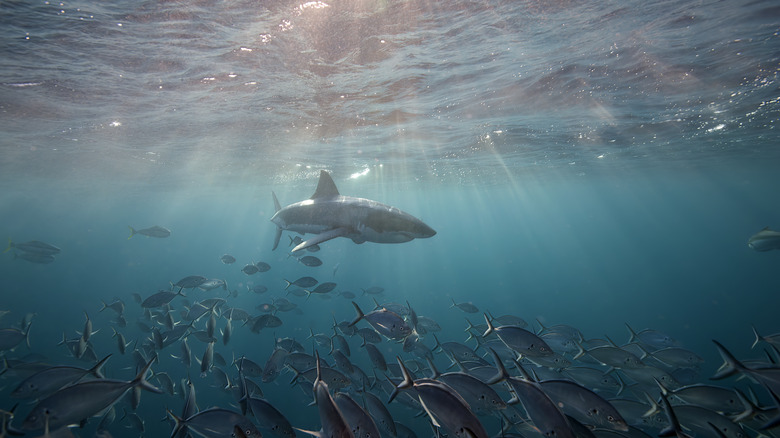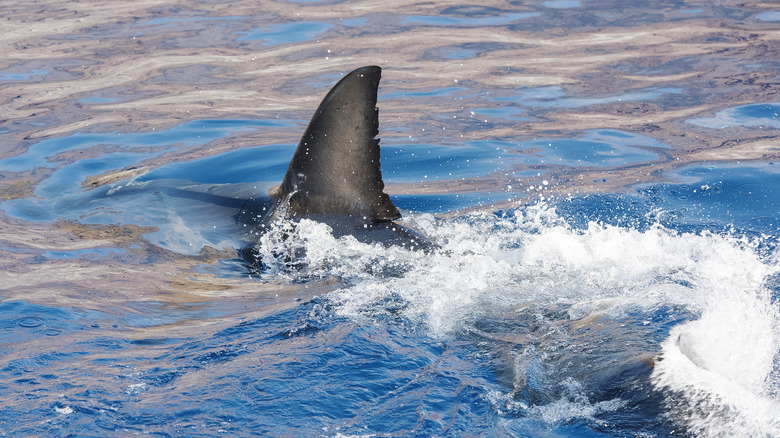A Marine Biologist Breaks Down The Best Thing To Do If You See A Shark While Swimming
No one wants to run into a shark while enjoying a day at the beach. After all, the mere thought of seeing a fin cutting through the water can send chills down pretty much anyone's spine. This is especially thanks to films like "Jaws" and "Deep Blue Sea," which turned shark attacks and ocean predators into a pop culture phenomenon and unleashed a wave of unwarranted notoriety and fear.
Despite the fact that real-life shark encounters are actually pretty rare — unless you're actively hoping to see them face-to-face during a tour or cage diving experience — the fear they inspire is still very real. And no, you don't need to be anywhere near the world's most shark-infested beaches to experience the unsettling sensation that one might be lurking nearby. Luckily, there are a few strategies you can keep in mind to help you react appropriately in the unlikely situation that you might come across a shark.
Explore spoke with Marine Biologist and Ocean Advocate, Liv Dixon — who will also be appearing on Discovery's Shark Week 2024 — to discuss all things shark behavior and potential encounters. From knowing how to tell if a shark is acting threatening to the different ways swimmers can handle the situation, Dixon shared a series of valuable tips to help protect yourself from sharks and make you feel a lot more comfortable while you're in the water.
Understanding a shark's behavior
When it comes to shark encounters, one of the most important things you can do to avoid panic is to understand their behavior before immediately assuming that you're in danger. For starters, Dixon emphasizes that, in most cases, sharks actually want nothing to do with humans. "[Sharks] have highly sensitive electroreceptors that detect electrical impulses in the water," she explains, "so most people have more than likely already been in the water with a shark at some point in life but they have probably sensed you first and swam away."
That said, in the unlikely instance that you do spot a shark, there are certain behaviors that indicate whether it's unbothered by your presence or potentially aggressive. Dixon goes on, "If you do happen to encounter a shark, behaviors that indicate the shark is unbothered include it keeping a noticeable distance and swimming slowly and steadily." As for signs to watch out for that might indicate a more aggressive stance, Dixon points out "sudden, sharp turns, pectoral fins pointing downward in a triangle shape, and an arched back with the head pointing downward."
How to deal with a shark encounter
In addition to understanding the difference between an unbothered and an aggressive shark, Dixon also shared some advice on how to handle encounters: "The best thing you can do is to stay calm and composed, as sudden movements or splashing can mimic a struggling or dying fish and therefore attract sharks to come and investigate you further." Additionally, she also recommends giving the shark enough space but always maintaining eye contact. This approach will ultimately help you appear non-threatening while, at the same time, allowing you to keep track of their movements.
Alternatively, in cases where a shark is acting aggressively, Dixon emphasizes the importance of staying vigilant — as well as calm and collected. "Gradually swim backward towards the shore or a boat, avoiding sudden movements or splashing," she suggests. "If you are with others, alert them calmly about the situation."
As for protective gear — think underwater "bear mace" — Dixon has a pretty simple recommendation: "I think the best thing you can have on you is a mask and snorkel." At the end of the day, sharks don't realistically want to just feast on you, which means that these two items are more than enough to help you maintain a healthy dose of eye contact and keep a close watch on the shark's behavioral cues. Apart from that, remember that you're the visitor in their home — and being respectful will go a long way. Now go ahead and dive in — and happy swimming!
Shark Week starts Sunday, July 7th on Discovery, and will stream on Max.


